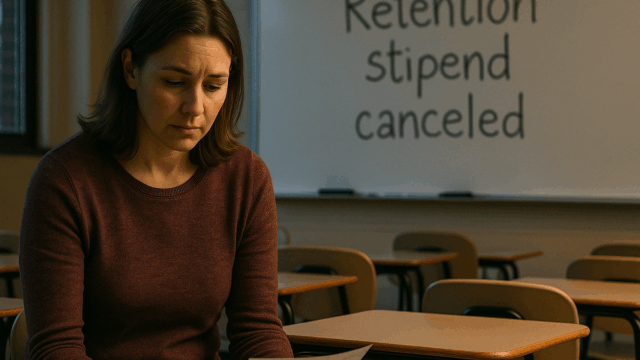When the email came through on a Friday afternoon, Julie Wojtko was downtown in a bargaining session. One of her colleagues — a middle school special education lead — forwarded it immediately.
The message, sent March 28 by the Las Cruces Public Schools Chief of Student Services, was brief but devastating: the state’s promised $5,000 retention stipends for special education teachers would not be coming after all.
Wojtko, president of NEA-Las Cruces, said she was quickly flooded with messages.
“There was a lot of frustration and disappointment expressed by those educators who were looking forward to the $5,000,” she said. “I was upset, too — we have a shortage of educators in special education, and I worried about what this would do for retaining the excellent staff already in these positions.”
The stipends, part of a phased “hard-to-staff” pay differential initiative from the New Mexico Public Education Department, had been promoted as a way to help recruit and retain educators in high-need areas. Teachers in Las Cruces and other districts say they were counting on the funds. Now, many are questioning whether they can afford to stay in the job.
A phased program with limited funds
The program was first outlined in a June 20, 2024, memo sent to district and charter school leaders by then-PED Secretary Arsenio Romero and Office of Special Education Director Margaret Cage. The memo introduced the new stipend program for the 2024–25 school year, funded through House Bill 2. While it emphasized recruitment stipends for educators in persistently vacant special education roles, it also noted that retention stipends would be offered “if funding permits.”
Recruitment stipends were set at $10,000, paid in two $5,000 installments. Retention stipends, though not assigned a dollar figure in the memo, were described as a secondary goal — one contingent on remaining funds after Phase I.
According to LCPS spokesperson Kelly Jameson, the district received that initial memo on June 27 and submitted 260 teacher names for Phase II consideration.
“The $5,000 stipend was for returning teachers, not new hires,” Jameson said. “We did not include this information in offer letters.”
LCPS emailed its special education staff on March 28 to inform them that Phase II would not be funded.
“They had a larger-than-expected response to Phase I,” Jameson said of NMPED. “We have contacted NMPED to advocate for our Phase II teachers to receive the stipends, and they have indicated they do not have funding for Phase II this school year.”
Jameson said the district provided feedback to the state on how to improve the program moving forward, including reducing stipend amounts if necessary to ensure all eligible staff are included.
State confirms funds were exhausted
In an April 17 response to Organ Mountain News, the Public Education Department said the decision not to fund Phase II was consistent with its original communications.
“The memo stated, ‘If funding permits, teacher retention stipends will also be addressed,’” said Communications Director Janelle Taylor García. She added that July 2024 training materials and an accompanying FAQ also emphasized the same condition.
According to PED, the initiative was made possible through state appropriations in HB2 — not federal funds — with dollar amounts guided by policy recommendations from the Legislative Education Study Committee. While HB2 included language allowing stipends and pay differentials for hard-to-staff special education positions, it did not earmark funds specifically for retention stipends.
“The majority of the funds were allocated or expended on Phase I,” Taylor García said, noting that more than 700 teachers were submitted for eligibility in the first semester alone — before Albuquerque Public Schools had even submitted its list.
PED issued a March 24 memo notifying districts that Phase II stipends would not be provided and later updated its website and contacted districts again on April 4.
The department said it never communicated directly with educators but responded to individual inquiries by email.
Teachers say communication was unclear
Wojtko acknowledged that PED’s early messaging did include contingency language but said many teachers still felt blindsided.
“I have heard mixed messages on assurances versus being transparent that the phases were contingent upon funding, so I cannot say either way,” she said. “I’ve just tried to support teachers and direct them to PED with questions.”
NEA-New Mexico President Mary Parr-Sanchez said she was first alerted by local union leaders in Belen and Las Cruces, where members had already begun counting on the extra income.
“I had members in two locals reach out to me about this issue,” she said.
Although NEA-New Mexico is not pursuing legal action, Parr-Sanchez said she called Education Secretary Mariana Padilla directly.
“I expressed my displeasure with this situation,” she said. “I think this is not a good look for them with all of the issues of a revolving door of the most inexperienced people being placed in these most challenging positions with the most vulnerable students.”
She added, “If our most vulnerable children were actually funded as a priority instead of an afterthought, we would have a different outcome.”
Phase III unlikely to move forward
LCPS officials said they were aware from the beginning that a third phase — targeting education assistants, speech therapists and other support staff — was a possibility. But Jameson said they now believe Phase III will not happen this year.
“When we were notified in February and again in April by NMPED that they only had funding for Phase I, we knew there would not be a possibility for the Phase III employees,” she said.
Parr-Sanchez said NEA-New Mexico intends to keep pushing for a more sustainable approach.
“We will continue to pursue this policy in the 30-day session,” she said, “as it was not funded in this past 60-day session.”



